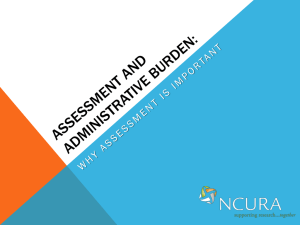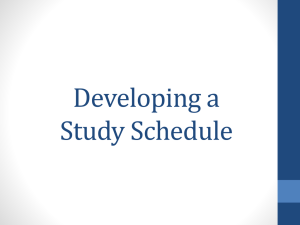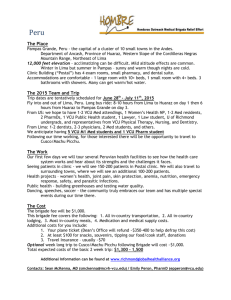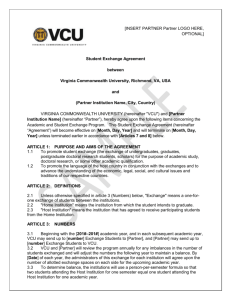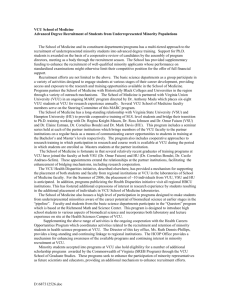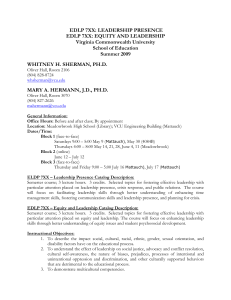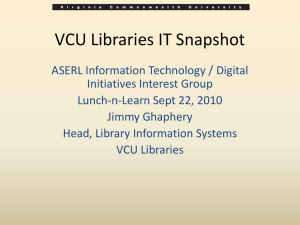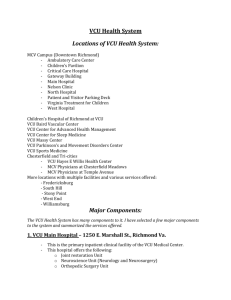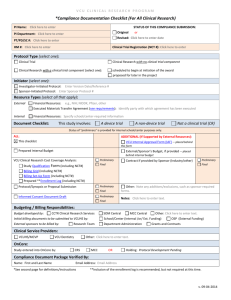Writing Course - Department of Statistical Sciences and Operations
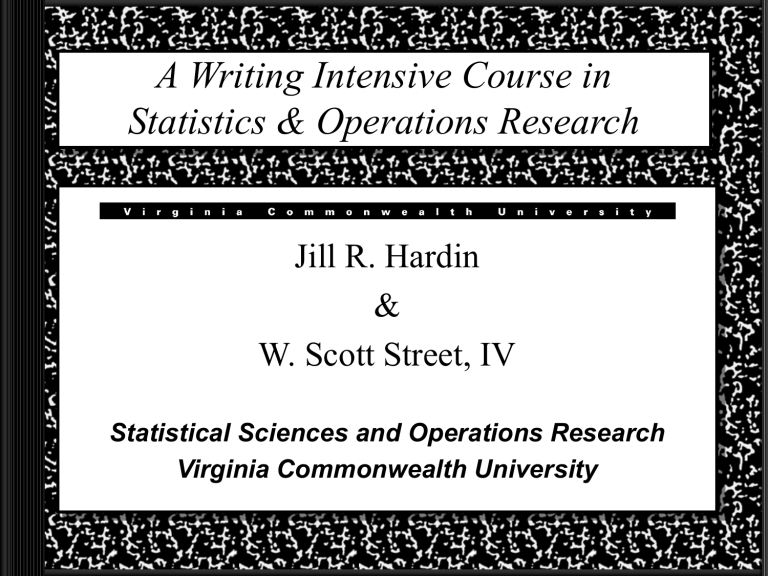
A Writing Intensive Course in
Statistics & Operations Research
Jill R. Hardin
&
W. Scott Street, IV
Statistical Sciences and Operations Research
Virginia Commonwealth University
Motivation
Why Develop a Writing Course?
• College writing intensive requirement
• Students requested help with improving their writing styles and techniques
• Faculty were disappointed with the quality of work being submitted in upper-level classes
• Industry contacts desire graduates with communications skills
Why Focus on Writing?
Student surveys revealed
– Many claim no professional writing skills
– Those who do are largely self-taught
– Students want help with
• Style and voice
• Audience awareness
• Research papers
• Citing references
• Conclusions
• Constructing solid arguments
Why Focus on Writing?
Faculty Surveys suggested inclusion of
– Social context
– Technical reports
– Revision
– Literature review
– Audience analysis
Why Focus on Writing?
Conversation with Tom York, Capital One
Group Manager suggested problems with
– Brevity and conciseness
– Structure and organization
– Identifying key points
– Adequate summaries
– Audience analysis
– E-mail form and etiquette
Why Focus on Writing: “E-mail-isms”
• Shift-phobia i have lefted a message on your answering machine wanting to know if you wanted to get together tomorrow morring and go over the project.
• Caps-addict
DR. STREET,
I DIDN'T MAKE IT TO CLASS TODAY BECAUSE I APPARENTLY
HAVE CAUGHT THE FLU. ATTATCHED IS QUIZ 2.
• Inappropriate/Nonprofessional E-mail Address msdiscobutt@-----.com
lookin4alady@-----.com
killPikachu@-----.com
findmytatoo@-----.com
From the Literature
• “Situated Learning” (Tyre & von Hippel)
– Students must practice writing in the major to become good at it
• “Discourse Communities” (Swales, Lemke)
– “Learning to ‘talk’ science means acting as a part of the scientific community”
– Students must learn specifically what is expected of them in the statistics and operations research communities
Structure
What Should be the Focus?
• Statistics and operations research, with special emphasis on writing or
• Writing, with special emphasis on writing in statistics and operations research
•
We chose the latter!
Our Approach
Based on student and faculty input, we aim to focus on four general areas:
–
Career Writing
– writing to pursue a career in statistics and operations research
– Academic Writing – writing in the academic world of statistics and operations research
– Popular Writing – writing about statistics and operations research for the lay person
–
Professional Writing
– writing about statistics and operations research in business and industry
• Topics
– Résumé
– Curriculum Vitæ
– Cover Letter
– Thank-you Letter
• Activities
– Career Center staff presentation
– Peer reviews of résumés with group discussion
Career Writing
• Sample Assignments:
– Evaluate your strengths and weaknesses. What specific skills do you possess?
– Given a job posting,
• Tailor your résumé to fit the job announcement.
• Write a cover letter specific to the announcement.
• Write a thank you letter giving thanks for the
“interview.”
Academic Writing
• Topics
– Literature Review
– Journal Article
– Analysis for other fields
• Activities
– Presentation by a research librarian
– Discussion with a faculty member who reviews journal submissions
• Sample Assignments:
– Literature review
• Brainstorm topics
• Locate sources for a chosen topic
• Write a summary of findings
• Present results to the class
– Outline and analyze a journal article.
Popular Writing
• Topics
– Newspaper Article, Press
Release, etc.
– Community Writing
• Activities
– Guest speakers to discuss
“real-life” interactions with the local/regional press
– Write a press release or newspaper article on the results of a research study
– Write for the local community
• Sample Assignment:
– Given a newspaper article which draws incorrect conclusions from a statistical study, write a letter to the editor that tactfully points out these errors.
You should also clearly explain why such conclusions are incorrect.
Professional Writing
• Topics
– Technical Report
– Executive Summary
– Memo
– E-mail Etiquette
• Activities
– Hear from local executives about the importance of good communication skills.
– Converse via e-mail throughout the semester.
• Sample Assignments:
– Complete a case study that requires communicating results to someone with no technical expertise.
– Write an executive summary of a given technical report.
Implementation
VCU Writing Intensive Guidelines
• Regular Writing
– Throughout entire semester
– Short-term and long-term assignments
• Feedback
• Revision
• Quantity
– Substantial amount of writing
– Major revisions count towards quantity
• Variety
How will we meet guidelines?
• Peer feedback
• Instructor feedback
• Substantial revision
– Students will be allowed to revise each assignment at least once
– Some assignments will be allowed unlimited revisions before a grade is assigned (within semester time limits)
• Quantity, variety, and regularity are inherent in the course structure.
Prerequisites and Other Details
• Prerequisite is one junior-level course in either statistics or operations research and sophomore-level English composition.
• Course will be designed so that students can focus on their own interests – either in statistics or in operations research.
• Course will be team-taught by statisticians and operations researchers.
In Short…..
Our aim is to help students integrate specific academic skills into broader professional skills.
Course Implementation
• Communications in Statistics & Operations
Research (STAT 490 / OPER 490)
• First offered in Spring 2003
• Taught by Drs. Hardin & Street
• 2 credit hours (upper-level)
Student Evaluations & Comments
• Students seemed to like the course
– 75% rated the course “Very Good” or “Outstanding”
– 87.5% found the team-taught aspect beneficial
– Only 1 student rated the level of learning as “Adequate” or below.
• Comments
– “This course was a lot of work, but I did learn a lot.”
– “I liked the team-taught aspect because we received two separate opinions (sometimes differing) on our work.”
– “Too much out of class work!!!”
Final Thoughts
Questions and/or Suggestions?
If you have any questions or suggestions regarding the SSOR writing intensive course, please feel free to contact us.
Dr. Jill R. Hardin
P.O. Box 843083
828-1301, ext. 156
JRHardin@VCU.edu
Dr. W. Scott Street, IV
P.O. Box 843083
828-1301, ext. 138
WSStreet@VCU.edu
This presentation is based on research that was funded in part by a Small Teaching
Grant that was awarded to Drs. Hardin and
Street by the Center for Teaching
Excellence at Virginia Commonwealth
University.
http://www.vcu.edu/cte/
THE END



